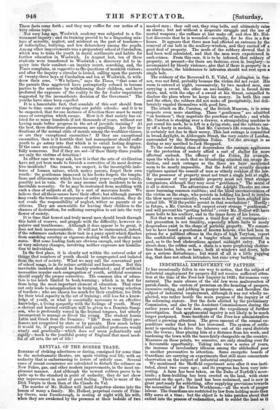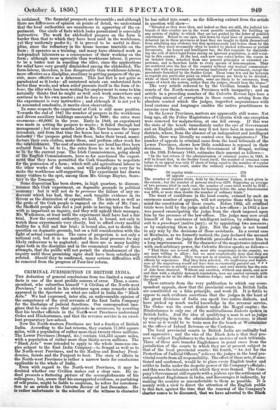INDUSTRIAL EMPLOYMENT OF PAUPERS. IT has occasionally fallen in our
way, to notice, that the subject of industrial employment for paupers did not receive sufficient atten- tion at the time of the Poor-law Liqiifty in 1833'; lirli-eations very natural. The main abuses of the old law were malversation of parish-funds, the custom of premium the breeding of paupers, excessive rating, and jobbing in pauper labour; and therefore the subject of industrial employment, although, it was not wholly ne- glected, was rather beside the main purpose of the inquiry or of the reforming statute. But the facts elicited by the preliminary Commission, and also by the Assistant Commissionera during the earlier years of the new ilawi,suggest the.expediency' of further investigation. Such sppplemental inquiry is not likely:fp be much longer postponed. Some:incidents of the Poor-law administration attract a growing attention. The gross amount of the anneal ex- penditure under that head has increased. The system of settle- ment is operating to drive the labourer out of the rural distriots into the towns ; thus placing him at a distance from his work, and burdening the town with the taxes fairly chargeable on the country. Measures on these points, we conceive, are only standing over for a favourable opportunity. Taking into view a series of years, the increase of involuntary idleness, among the ablebodied poor is another provocative to attention. Some energetic boards of Guardians are carrying on experiments that still more concentrate observation on the subject of industrial employment. We mentioned the Sheffield experiment soon after it was insti- tuted, about two years ago ; and its progress has been very inte- resting. A farm has been taken, on the Duke of Norfolk's moor- lands ; a farm-building has been erected on the land, with stone quarried on the spot ; the land has been reclaimed, and is now in great part ready for subletting, after supplying provisions towards the necessities of the Union Workhouse,—all the work of pauper labour. The Guardians are restricted by law from holding more than
i
fifty sores at a time; but the object is to take patches about that extent into the process of reclamation, and to sublet the land as it is reclaimed. The financial prospects are favourable; and although there are differences of opinion on points of detail, we understand that the local authorities are unanimous in approving of the ex- periment. One eircre of facts which looks paradoxical is especially instructive. The -work for ablebodied paupers on the farm is harder than that to which they have been used in the workhouse, yet they uniformly graeefteorrt it is proved to be useful in disci- pline, since the refractory in the house become tractable on the farm ; it operates as a training, and many have obtained work as independent labourers as a consequence of their working on the farm ; although more agreeable than workhouse labour, it proves to be a better test in repelling the idler, since the applications for relief have very greatly diminished among the ablebodied. The farm-labour, therefore, is less disagreeable than workhouse-labour, more effective as a discipline, auxihary in getting paupers off the pa- - risb, more effective as a deterrent. This last fact is not quite so paradoxical as it looks: all untutored minds can understand facts better than words, and when relief presents itself in the form of la- bour, the idler who has been waiting for employment to come to him - naturally thinks that he might as well seek work somewhere and continue to be his own master ; and he does so. Thus far, we say, the experiment is very instructive ; and although it is not yet to to accounted conclusive, it merits close observation.
In some respects the experiment at Cork is still more positive. Towards the end of 1847 the number of paupers in the workhouse and divers auxiliary buildings amounted to 7000 ; the rates were enormous-40,0001. in the year. Early in 1848, an experiment was made in setting the paupers to weave ; it failed through bad management ; but nine months later a Mr. Carr became the super- intendent, and from that time the house has been a scene of busy Indus* : the paupers grind their flour, bake their bread, manu- facture. their own clothes, make them, and perform other work for the stablislcinent. The cost of maintenance per head has thus been reduced fromi18. 4d. to ls., the rates from 4s. or 4s. 6d. probably for the current year. The Irish Commissioners, going ahead of the'Enklish Commissioners, have so far sanctioned the experi- ment that they have permitted the Cork Guardians to negotiate for the poimession of a farm ; which will add agricultural labour to the other works of the union, and will probably go very for to make the workhouse self-supporting. The experiment has drawn many visiters to the, spot, among them Mr. George Hayter, Secre- tary to the Treasuurtyy, borne disposition has been shown, in high quarters, to discoun- 'utenance this. Cork experiment, on dogmatic grounds in political -,economy : but it will not do to presume the failure of any en- deavour which has had, thus far, such tangible evidence in its "favour as the diminution of expenditure. The interest as well as -the pride of the Cork people is engaged on the side of Mr. Carr ; the Sheffield people also feel a just pride in having. taken the lead with so important an inquiry, and they will uphold theirr, Mr. Watkinson, at least until the experiment shall have hadmafafair trial. Now the central authority, we hold, is bound, not :only to watch these experiments very closely, but to afford every nee facility for a full and fair trial ; is bound also, not to decide the question on dogmatic grounds, but on a full consideration with the light of actual experience. The curse of pauperism is not only a national evil, but it is too manifest in its local pressure for any likely endeavour to be neglected ; and there are so many healthy signs both in the discipline and in the economical results of these attempts, that the public will not permit the abandonment of the inquiry until those promising signs shall have been satisfactorily refuted. Should they be confirmed, many serious difficulties will be removed from the progress of Poor-law reform.



























 Previous page
Previous page